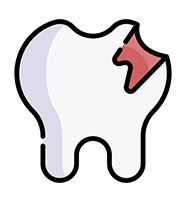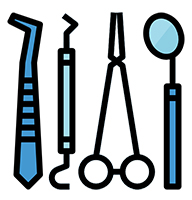There are interesting studies on oral health’s role in disease prevention. At first blush, avoiding gum disease has more impact than mitigating the ick factor. But is there a link between dental health and heart disease?
Several sources declare that gum disease is associated with an increased risk of developing heart disease. One study by the American Heart Association (AHA) investigated a correlation between inadequate toothbrushing and cardiovascular disease, specifically, are poor brushing habits associated with risk of having a heart attack, heart failure or stroke? The study’s data seemed to put some teeth into the theory that oral health is a factor in cardiovascular health. Study participants who reported brushing less than twice a day (and for fewer than two minutes each session) had a three-fold increased risk of a heart attack or stroke compared to those who brushed at least two minutes, twice a day.
Harvard Medical School also presented these theories:
- The bacteria that cause gum inflammation (also known as gingivitis) and severe periodontitis can travel to blood vessels elsewhere in the body, triggering inflammation and damage, which may lead to blood clots, heart attack or stroke.
- It’s the body’s actual immune response to the bacteria (inflammation) that can cause vascular damage elsewhere in the body, including in the heart and brain.
The gum disease known as periodontitis was cited as one of many conditions that can cause ongoing inflammation in the body. In a report published in the AHA journal Hypertension, scientists said gum disease appeared to increase blood pressure and interfere with medications to treat it. While the researchers reported no direct connection between gum disease and cardiovascular disease, they postulated that the conditions may occur together if a third risk factor (such as smoking) is also present.
According to the Mayo Clinic, the American Heart Association reviewed available scientific evidence and concluded that poor oral health has not yet been proven to cause heart disease. Thomas J. Salinas, D.D.S. stated, “While taking good care of your teeth and gums isn’t a proven way to prevent heart disease, removing oral bacteria through regular brushing, flossing and oral checkups is an investment in your overall health.”
The Cleveland Clinic updated a pre-2021 article (that neither supported, nor refuted, a link between periodontal disease and cardiovascular disease), with this statement by periodontist Dr. Sasha Ross in October 2022, “Keep in mind that even though cardiovascular disease and periodontal disease are associated with each other, there’s so far no evidence that one causes the other.”
Even though the link between oral health and heart health appears less than definitive, it’s still important to take care of teeth, gums…and yes, the cardiovascular system. The Centers for Disease Control and Prevention (CDC) says:
The three oral conditions that most affect overall health and quality of life are cavities, severe gum disease and severe tooth loss.

By age 8, 52% of kids have had a cavity in their baby teeth.

Low-income children are twice as likely to have cavities as higher-income children.

One in four adults aged 20 to 64 currently have cavities.
The CDC recommends:
- Brushing twice a day, preferably with a fluoride toothpaste
- Cleaning between teeth daily with floss or interdental cleaner
- Visiting the dentist regularly for professional cleanings and oral examination
- Checking with a dentist about using supplemental fluoride
- Checking with a dentist about dental sealants, a plastic protective coating that’s applied to the chewing surfaces of the back teeth to protect them from decay
As for heart disease, what are the known risks?
Several health conditions, as well as lifestyle, age and family history can increase the risk for heart disease. While you can’t change your blood relatives or your age, 47% of Americans have at least one of three key risk factors for heart disease that can be controlled: high blood pressure, high cholesterol and smoking. Additionally, stroke and heart attack are threatening younger adults.
If you have risk factors and are concerned about heart disease, ask your doctor about proven ways to reduce the threats to your health, such as stopping smoking, exercising regularly and maintaining a healthy weight.
While there seems to be a link between dental health and other health conditions, the causation is not completely clear; experts say it’s important to take care of both. Grab that toothbrush and do your lunchtime tooth check.











